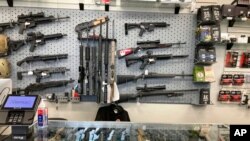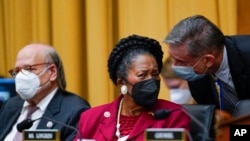U.S. President Joe Biden implored Congress in a White House address Thursday night to approve "common-sense measures" to curb the deadly mass shootings that have shocked Americans, calling for new restrictions that he said would help combat gun violence.
Biden urged Congress to reinstate the 1994 ban on semiautomatic, rapid-fire assault weapons and high-capacity magazines that expired in 2004.
“And if we can't ban assault weapons, then we should raise the age to purchase them from 18 to 21,” he said, noting that the gunman in last month’s school shooting in Uvalde, Texas, purchased two assault weapons as soon as he turned 18 and used them to kill 19 students and two teachers. Seventeen others were injured.
Biden pushed for other measures, including strengthening background checks for gun buyers, enacting so-called red-flag laws, which allow authorities to confiscate guns for a period of time if someone is a threat or exhibits mental instability, and safe storage laws.
“Lock it up. Have trigger locks. If you don't and something bad happens, you should be held responsible,” the president added.
He also pushed to repeal the immunity that protects gun manufacturers from liability.
“They're the only industry in this country that has that kind of immunity,” Biden said. “Imagine, if the tobacco industry had been immune from being sued, where we’d be today.”
The measures he advocated are unlikely to win approval in the politically divided Congress, where lawmakers for years have been at odds over gun legislation.
Republicans condemn mass shootings and gun violence but have regularly blocked gun control legislation, saying that the proposed restrictions that Democrats favor would impinge on the freedom of law-abiding citizens and are at odds with the right of Americans to possess guns that is enshrined in the Second Amendment to the U.S. Constitution.
In his remarks, Biden quoted a letter he said he'd received from a grandmother who lost her granddaughter in the Texas school shooting: “Erase the invisible line that is dividing our nation. Come up with a solution and fix what’s broken. And make the changes that are necessary to prevent this from happening again.”
US stands alone
Other countries have witnessed gun massacres but the U.S. stands alone in that it has not been able to pass tougher gun control laws in the aftermath of those tragedies.
A year after the 1996 school shooting in Dunblane, Scotland, in which 16 children and their teacher died, the United Kingdom banned private ownership of most handguns.
In the same year, after a mass shooting in Australia that left 35 people dead, Canberra banned nearly all semiautomatic rifles and shotguns and launched a program to buy back more than 600,000 of the weapons from Australian gun owners.
In 2019, less than a month after the killing of 51 Muslim worshippers at two Christchurch mosques by a white supremacist gunman, New Zealand lawmakers voted overwhelmingly to ban military-style, semiautomatic weapons and enacted a buy-back program.
After mass shootings in these countries people across the political spectrum have come together to make compromises to stop gun violence, said Jonathan Metzl, a sociologist at Vanderbilt University.
“We don't have that in this country,” Metzl told VOA, adding that other countries don't have a corporate gun lobby, such as the National Rifle Association.
It is estimated that U.S. civilians own nearly 400 million firearms. About 40% of U.S. adults say they live in a household with a gun, including 30% who say they personally own one, according to a 2021 Pew Research report. Forty-four percent of Republicans and Republican-leaning independents say they personally own guns, compared with 20% of Democrats and Democratic-leaning voters.
While most Americans own handguns or rifles primarily for protection or hunting, millions carry rapid-fire weapons such as the AR-15.
Sixty-one percent of Americans say there should be a ban on the manufacture, possession and sale of semiautomatic guns, according to the latest Gallup poll.
Limited restrictions
In order to achieve compromise, some lawmakers are attempting to craft more limited restrictions in the aftermath of the three mass shootings within the past month. In addition to the Uvalde school shooting, 10 Black people were gunned down in a racist attack at a Buffalo, New York, grocery store, and four people were killed at a Tulsa, Oklahoma, medical facility.
The House Judiciary Committee on Thursday debated a bill it said was an emergency response to the mass shootings. It would raise the purchase age for an assault weapon from 18 to 21 and attempt to curb the sale of large-capacity ammunition magazines and "ghost guns," which are untraceable and unregistered weapons. The measure could pass the Democratic-controlled House as early as next week but is not expected to advance in the Senate, which is divided equally, with 50 Republicans and 50 Democrats.
In the absence of broad congressional action, some state lawmakers, including in New York and California, are pushing for tighter gun laws in their jurisdictions.
“State legislation seldom makes headlines, but it’s terribly important because, in the American system, states have primary responsibility for gun regulation,” Kirstin Goss, professor of public policy and political science at Duke University, told VOA.
After the 2007 Virginia Tech shooting, Congress passed a bill to incentivize states to enter the records of people who are barred from buying or owning firearms into the national background-check system. But state lawmakers face the same pressure from the gun lobby as their peers in the nation's capital.
In the United States this year, there have been 232 mass shootings, defined as incidents in which four or more people, not including the shooter, have been injured or killed. Not a single week has passed without at least four mass shootings, according to the Gun Violence Archive, a nonprofit research group.









